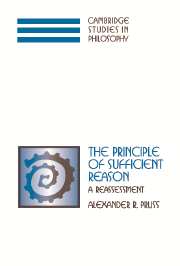3 - The Causal Principle and the PSR
Published online by Cambridge University Press: 27 July 2009
Summary
CHAINS OF CAUSES
The Hume-Edwards-Campbell Principle
Say that a chain of causes is ungrounded if it does not contain a first cause that causes everything else in the chain and if, further, there is no cause outside the chain that causes the chain as a whole. One major difference between a Causal Principle and a PSR is that a CP, prima facie, is compatible with an ungrounded infinite chain of causes, while a PSR is not, since there is no explanation for the whole chain. The latter incompatibility claim can be objected to, however. Hume writes: “Did I show you the particular causes of each individual in a collection of twenty particles of matter, I should think it very unreasonable, should you afterwards ask me, what was the cause of the whole twenty. This is sufficiently explained in explaining the cause of the parts” (Hume, 1779, Part IX).
The Hume-Edwards principle (see Edwards, 1959) states that if one has explained each conjunct of a proposition or each member of an aggregate, then one has explained the whole. One might then try to explain why some aggregate of all contingent beings exists by saying that being A exists because it is caused by B, being B exists because it is caused by C, ad infinitum.
The Hume-Edwards principle, however, is false. The principle depends crucially on explanation's being agglomerative: if one has explained the conjuncts, one has explained the conjunction. But explanation is not agglomerative, as Gale (1991, pp. 254–255) has argued.
Information
- Type
- Chapter
- Information
- The Principle of Sufficient ReasonA Reassessment, pp. 41 - 72Publisher: Cambridge University PressPrint publication year: 2006
